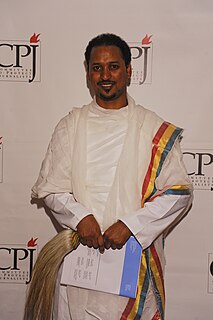Related Research Articles
Journalism is the production and distribution of reports on the interaction of events, facts, ideas, and people that are the "news of the day" and that informs society to at least some degree. The word, a noun, applies to the occupation, the methods of gathering information, and the organizing literary styles. Journalistic media include: print, television, radio, Internet, and, in the past, newsreels.

Mass media in Liberia include the press, radio, television, fixed and mobile telephones, and the Internet.

Sub-Saharan Africa is, geographically, the area of the continent of Africa that lies south of the Sahara. According to the United Nations, it consists of all African countries and territories that are fully or partly south of the Sahara. While the United Nations geoscheme for Africa excludes the Sudan from its definition of sub-Saharan Africa, the African Union's definition includes the Sudan but instead excludes Mauritania.

Salva Kiir Mayardit, also known as Salva Kiir, is a South Sudanese politician who has been President of South Sudan since its independence on July 9th 2011. Prior to independence, he was President of the Government of Southern Sudan, as well as First Vice President of Sudan, from 2005 to 2011. He was named Commander-in-Chief of the Sudan People's Liberation Army (SPLA) in 2005, following the death of John Garang.

Andrew Mwenda is a Ugandan print, radio and television journalist, and the founder and owner of The Independent, a current affairs newsmagazine. He was previously the political editor of The Daily Monitor, a Ugandan daily newspaper, and was the presenter of Andrew Mwenda Live on KFM Radio in Kampala, Uganda's capital city.

The mass media in Burkina Faso consists of print media and state-supported radio, news, and television stations, along with several private broadcasters with programs consisting of sports, music, cultural, or religious themes.

The African Union (AU) is a continental union consisting of 55 member states located on the continent of Africa. The AU was announced in the Sirte Declaration in Sirte, Libya, on 9 September, 1999, calling for the establishment of the African Union. The bloc was founded on 26 May 2001 in Addis Ababa, Ethiopia, and launched on 9 July 2002 in Durban, South Africa. The intention of the AU was to replace the Organisation of African Unity (OAU), established on 25 May 1963 in Addis Ababa by 32 signatory governments; the OAU was disbanded on 9 July 2002. The most important decisions of the AU are made by the Assembly of the African Union, a semi-annual meeting of the heads of state and government of its member states.
Gwen Lister is a Namibian journalist, publisher, anti-apartheid and press freedom activist.
Ferial Haffajee is a South African journalist and newspaper editor. Haffajee was editor of City Press newspaper from July 2009 until July 2016 and was previously the editor of the Mail & Guardian newspaper.

Eritrea, officially the State of Eritrea, is a country in the Horn of Africa region of Eastern Africa, with its capital and largest city at Asmara. It is bordered by Ethiopia in the south, Sudan in the west, and Djibouti in the southeast. The northeastern and eastern parts of Eritrea have an extensive coastline along the Red Sea. The nation has a total area of approximately 117,600 km2 (45,406 sq mi), and includes the Dahlak Archipelago and several of the Hanish Islands.

Dawit Kebede is an Ethiopian journalist and winner of the 2010 CPJ International Press Freedom Award.
Newspapers published in Nigeria have a strong tradition of the principle of "publish and be damned" that dates back to the colonial era when founding fathers of the Nigerian press such as Nnamdi Azikiwe, Ernest Ikoli, Obafemi Awolowo and Lateef Jakande used their papers to fight for independence.

South Sudan, officially known as the Republic of South Sudan, is a landlocked country in Central Africa. It is bordered by Ethiopia, Sudan, Central African Republic, Democratic Republic of the Congo, Uganda and Kenya. Its population was estimated as 12,778,250 in 2019. Juba is the capital and largest city. The nation is sometimes informally referred to as the Nilotic Republic.
The following is a historical events of Addis Ababa, the capital of Ethiopia, including its formation prior to 20th century by chronology.
Mass media in Namibia includes radio, television, and online and print formats.
References
- 1 2 3 4 5 6 7 8 9 "WorldCat". USA: Online Computer Library Center . Retrieved 21 February 2013.
- ↑ "Awramba Times is the latest Ethiopian paper to vanish". Committee to Protect Journalists. 9 December 2011. Retrieved 21 February 2013.
- ↑ "Home". Ethiopian Gazette. 2021-11-05. Retrieved 2021-12-06.
- ↑ Tom Rhodes (20 July 2011). "Ethiopia: Terrorists? A Look At Two Jailed Local Journalists". Committee to Protect Journalists. Archived from the original on 9 January 2012. Retrieved 24 August 2012.
- ↑ Mohammed Ademo (13 August 2012). "Media restrictions tighten in Ethiopia". Columbia Journalism Review. Archived from the original on 22 August 2012. Retrieved 24 August 2012.
- 1 2 "Ethiopia: News". Africa South of the Sahara. Stanford University. Retrieved 21 February 2013.
- ↑ "About Us". Addis Ababa: Media & Communications Center. Retrieved 21 February 2013.
- ↑ Meseret Chekol Reta (16 May 2013). The Quest for Press Freedom: One Hundred Years of History of the Media in Ethiopia. University Press of America. ISBN 978-0-7618-6002-0.